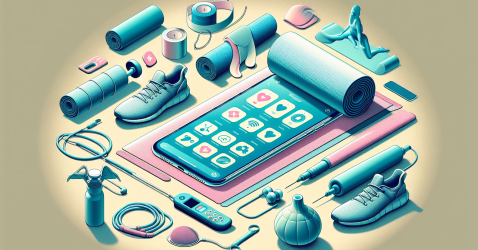Best Self-care Strategies For Coping With Chronic Illness Or Pain?
Living with chronic illness or pain can be extremely challenging, but self-care strategies can help alleviate the physical and emotional toll it takes on you. In this article, we will explore the best techniques to nurture your well-being and manage your condition more effectively. Whether it’s making time for rest and relaxation, practicing mindfulness, or seeking support from others, there are many approaches you can try to enhance your quality of life and find comfort amidst the difficulties. Discover these practical self-care strategies that can empower you on your journey towards better health and happiness.
Physical Self-Care Strategies
Exercise
Engaging in regular exercise is crucial for maintaining physical well-being and managing chronic illness or pain. It may seem challenging at first, but finding activities that you enjoy and are suitable for your condition can make a significant difference. Whether it’s walking, swimming, gentle yoga, or physical therapy exercises, incorporating movement into your routine can help increase strength, flexibility, and overall fitness levels. Remember to start slowly and gradually increase your activity level to avoid exacerbating any symptoms.
Pain Management Techniques
Living with chronic pain can be incredibly challenging, but there are various pain management techniques that you can incorporate into your self-care routine. These may include heat or cold therapy, transcutaneous electrical nerve stimulation (TENS), acupuncture, or taking over-the-counter pain relievers. It’s essential to consult with your healthcare provider to determine which techniques are safe and effective for your specific condition. Additionally, practicing relaxation techniques such as deep breathing, guided imagery, or progressive muscle relaxation can also help reduce pain and promote physical well-being.
Sleep Hygiene
Quality sleep is vital for your overall health and well-being, especially when dealing with a chronic illness or pain. Establishing a consistent sleep schedule, creating a relaxing bedtime routine, and ensuring your sleep environment is comfortable can greatly improve your sleep quality. Avoiding caffeine and electronic devices before bed, keeping your bedroom cool and dark, and practicing relaxation techniques can also promote better sleep. If you are struggling with sleep, consider speaking with your healthcare provider about potential strategies or medications to improve your sleep hygiene.
Nutrition
Eating a well-balanced and nutritious diet plays a crucial role in managing chronic illness or pain. Ensure that your diet includes a variety of fruits, vegetables, whole grains, lean proteins, and healthy fats. It’s also important to stay hydrated by drinking enough water throughout the day. If you have specific dietary restrictions or considerations related to your condition, consulting with a registered dietitian can help guide you towards making informed decisions about your nutrition. Remember, small changes to your diet can have a significant impact on your overall health and well-being.
Emotional Self-Care Strategies
Seeking Support
Dealing with chronic illness or pain can sometimes be emotionally overwhelming, which is why seeking support is essential. This can come in various forms, such as talking to a trusted friend or family member who can provide a listening ear or even joining a support group with individuals who are going through similar experiences. Sharing your feelings and experiences with others who understand can help foster a sense of belonging and reduce feelings of isolation. Additionally, professional therapy or counseling can offer valuable guidance and support as you navigate through the emotional aspects of your condition.
Practice Mindfulness and Meditation
mindfulness and meditation practices can be immensely beneficial for managing the emotional impact of chronic illness or pain. These practices involve being fully present in the moment and cultivating a non-judgmental awareness of your thoughts, feelings, and bodily sensations. By regularly engaging in mindfulness or meditation, you can increase self-awareness, reduce stress, and promote emotional well-being. There are several resources available, such as guided meditation apps or mindfulness courses, that can help you develop this practice.
Engaging in Creative Activities
Engaging in creative activities can provide a helpful outlet for expressing and processing emotions related to your chronic illness or pain. Whether it’s painting, writing, playing a musical instrument, or cooking, finding activities that bring you joy and allow for self-expression can be incredibly therapeutic. These activities not only offer a distraction from any pain or discomfort but can also boost your mood and improve overall emotional well-being. Remember, creativity comes in many forms, so don’t be afraid to explore and experiment with different activities to find what resonates with you the most.
Journaling
Keeping a journal can be a powerful tool for self-reflection, emotional release, and tracking your health journey. By writing down your thoughts, feelings, and experiences, you can gain insight into your emotions, identify patterns, and develop a greater understanding of your condition. Journaling can also serve as a record of your symptoms, treatments, and any adjustments you make to your self-care routine, enabling you to identify what works best for you over time. Consider setting aside dedicated time each day or week to journal, allowing yourself the space to express yourself freely without judgment.
Social Self-Care Strategies
Maintaining Relationships
Despite the challenges of chronic illness or pain, maintaining healthy relationships is crucial for your overall well-being. Communicate openly with your loved ones about your condition, how it affects you, and what you need from them. This open dialogue can help create understanding, empathy, and support. Be mindful of your limitations and communicate them clearly to avoid overexertion. Regularly scheduling quality time with friends and family, even if it’s through virtual means, can foster connection and combat feelings of isolation.
Joining Support Groups
Support groups provide a safe space to connect with others who are facing similar challenges. Joining a support group can offer emotional support, practical advice, and a sense of belonging. Whether it’s an in-person or online support group, the opportunity to share your experiences, listen to others, and learn from their journeys can be invaluable. Hearing stories of resilience and finding a community that understands can provide immense comfort and encouragement throughout your own healing process.
Setting Boundaries
Setting boundaries is crucial for protecting your emotional well-being, especially when living with chronic illness or pain. Recognize your limitations and communicate them clearly to others, whether it’s around physical activity, social commitments, or emotional availability. Saying no when necessary, without feeling guilty, allows you to prioritize your needs and conserve your energy. Learning to assertively communicate your boundaries can help prevent overwhelm, reduce stress, and ensure that you have the necessary time and space to focus on your self-care.
Seeking Emotional Support
While friends and family can offer emotional support, sometimes seeking professional help is necessary. If you find that your emotions are significantly impacting your daily life or mental well-being, consider speaking with a mental health professional. They can provide guidance, tools, and therapeutic support tailored to your specific needs. Remember, seeking professional help is a strength, and there is no shame in reaching out for assistance when you need it.
Mental Self-Care Strategies
Educate Yourself
Education about your condition is empowering. By learning as much as possible about your chronic illness or pain, you can better understand your symptoms, treatments, and potential management strategies. Consult reputable sources such as medical websites, books, peer-reviewed articles, and trusted healthcare professionals to gather accurate information. Increasing your knowledge will not only help you make informed decisions about your own care but also enable effective communication with your healthcare providers.
Manage Stress Levels
Managing stress is crucial for promoting mental well-being when living with chronic illness or pain. Find stress management techniques that work best for you, such as deep breathing exercises, progressive muscle relaxation, or engaging in activities that bring you joy. Identifying stress triggers and developing strategies to alleviate or cope with them can help prevent stress from exacerbating your symptoms. Remember that stress reduction is an ongoing process, and regularly dedicating time to stress management is essential for your mental and physical health.
Practice Relaxation Techniques
Engaging in relaxation techniques can help calm your mind and reduce stress, promoting mental well-being. Practices such as deep breathing, guided imagery, or taking a warm bath can induce a relaxation response and reduce anxiety. Explore different relaxation techniques and incorporate them into your daily routine to establish a sense of calm and tranquility amidst the challenges of your condition. Combining relaxation techniques with mindfulness or meditation practices can provide a holistic approach to managing your mental well-being.
Cognitive Behavioral Therapy
Cognitive Behavioral Therapy (CBT) is a therapeutic approach that focuses on identifying and changing negative thought patterns and behaviors. It can be highly effective in managing chronic illness or pain by helping you develop healthier ways of coping and adapting to your condition. CBT can assist in reframing negative thinking, managing stress, and improving overall mental well-being. Consider seeking a qualified mental health professional who specializes in CBT to guide you through this evidence-based therapy and support you in developing new strategies for managing your mental health.
Professional Self-Care Strategies
Communicate with Healthcare Providers
Effective communication with your healthcare providers is essential for receiving the best care possible. Be proactive in voicing your concerns, asking questions, and seeking clarification about your condition, treatments, and medications. Maintaining open and honest communication allows for better collaboration and ensures that your healthcare team has a comprehensive understanding of your needs. Remember, you are the expert of your own body, and your perspective is valuable in determining the best course of action for your care.
Advocate for Yourself
Advocating for yourself means actively participating in your healthcare decisions and taking an active role in your treatment plan. Stay informed about your condition and treatment options by doing research and seeking second opinions when necessary. Ask for explanations, clarification, and alternatives if something doesn’t feel right. Remember that you have the right to seek the care that aligns with your goals and values. Building a partnership with your healthcare team based on mutual respect and open communication can help ensure that your voice is heard and your needs are met.
Keep Track of Medical Information
Managing a chronic illness or pain often involves multiple healthcare providers, medications, and treatment plans. Keeping track of your medical information, including diagnoses, medications, test results, and appointments, can help you stay organized and informed. Consider using a journal, notebook, or digital tool to record this information. Having everything readily accessible can facilitate effective communication with your healthcare team and enable you to make well-informed decisions about your care.
Seek Second Opinions
If you have uncertainties about your diagnosis, treatment plan, or medical options, don’t hesitate to seek a second opinion. Consulting with another healthcare provider can provide you with additional insights, alternative treatment options, or validation of your current plan. Seeking a second opinion is not a sign of doubt or mistrust; it is an important step in ensuring that you have explored all available options and are receiving appropriate care. Remember that your health is a priority, and seeking multiple perspectives can help you make the most informed decisions for your well-being.
Spiritual Self-Care Strategies
Engage in Spiritual Practices
Engaging in spiritual practices can provide solace, comfort, and a sense of purpose when dealing with a chronic illness or pain. This can involve participating in religious or spiritual rituals, attending services, or exploring personal beliefs through prayer or meditation. Spiritual practices can help foster connection, inner peace, and resilience amidst the challenges you may face. Identifying and nurturing your spiritual needs can provide a source of strength and support throughout your journey.
Connect with Nature
Nature has a way of rejuvenating and restoring the spirit. Spending time outdoors, whether it’s in a garden, park, or natural setting, can offer a sense of calm and connectedness. Engage in activities such as walking, hiking, gardening, or simply sitting quietly surrounded by nature. Appreciating the beauty and tranquility of the natural world can have a profound impact on your spiritual well-being, alleviating stress and promoting a sense of serenity.
Explore Personal Beliefs
Chronic illness or pain can evoke existential questions and prompt you to reflect on your personal beliefs and values. Take the time to explore and examine your own beliefs, values, and philosophy of life. Engage in conversations, read books or articles, and attend discussions or workshops that explore various perspectives. This process of self-discovery can offer insight, comfort, and a foundation to navigate the emotional and spiritual aspects of your journey.
Find Meaning and Purpose
Finding meaning and purpose in life is a powerful way to cope with chronic illness or pain. Reflect on what brings you joy and fulfillment, and seek ways to incorporate these aspects into your daily life. This may involve pursuing hobbies or interests, volunteering, or making meaningful connections with others who share similar passions. Recognizing and nurturing what brings meaning to your life can provide a sense of purpose, hope, and resilience in the face of adversity.
Financial Self-Care Strategies
Budgeting and Financial Planning
Managing the financial aspects of living with chronic illness or pain can be challenging. Develop a budget and financial plan that takes into account your medical expenses, insurance coverage, and any potential changes in employment or income. Identify areas where you can cut expenses or seek financial assistance. Consider consulting with a financial advisor or counselor who specializes in healthcare-related finances to help you navigate this aspect of self-care effectively.
Explore Healthcare Options
Research and explore all available healthcare options to ensure that you are receiving the best care possible while managing your financial situation. This may involve exploring different insurance plans, understanding the coverage and benefits available to you, and considering alternative care options such as telemedicine or community clinics. Understanding your healthcare options can help you make informed decisions about your care while minimizing financial stress.
Find Assistance Programs
There are various assistance programs available that can provide financial support to individuals living with chronic illness or pain. These programs may offer assistance with medication costs, medical supplies, or healthcare services. Research local and national resources, such as patient advocacy organizations or government programs, to identify potential programs that can help alleviate the financial burden associated with your condition. Applying for financial assistance programs can relieve some of the stress and ensure that you have access to the care you need.
Seek Financial Counseling
If you find yourself overwhelmed by the financial implications of your chronic illness or pain, consider seeking the guidance of a financial counselor. These professionals specialize in helping individuals navigate financial challenges, develop realistic budgets, and create strategies to manage debt. A financial counselor can provide personalized advice and support to help you regain control of your finances and reduce financial stress, allowing you to focus on your self-care and well-being.
Practical Self-Care Strategies
Organize Your Living Space
Maintaining an organized living space can greatly contribute to your overall well-being. Clutter can create stress and make it difficult to find what you need. Take the time to declutter your living space, creating designated areas for essential items and keeping surfaces clean and tidy. Use storage solutions that work for your specific needs and establish systems to keep things organized. Having an organized living space can promote a sense of calm and make your daily routine more efficient and enjoyable.
Create a Daily Routine
Establishing a daily routine can provide structure and stability, which is especially beneficial when managing a chronic illness or pain. Plan out your day, incorporating time for self-care activities, rest, and meaningful activities that bring you joy. Be realistic about your energy levels and limitations, ensuring that your routine is attainable and sustainable. Having a daily routine can instill a sense of order, help manage symptoms, and provide a framework for prioritizing your physical and emotional well-being.
Utilize Assistive Devices
Assistive devices can greatly enhance your ability to perform daily tasks and improve your overall quality of life. Depending on your specific needs, this may include mobility aids such as canes, walkers, or wheelchairs, or devices that assist with medication management, vision, hearing, or household tasks. Consult with your healthcare provider or occupational therapist to evaluate which assistive devices may be beneficial for you. Using these devices can help conserve energy, reduce pain, and promote independence in carrying out daily activities.
Manage Medications
Managing medications can be challenging when dealing with a chronic illness or pain. Develop strategies to ensure that you take your medications as prescribed and stay organized. Consider using pill organizers, setting reminders, or utilizing smartphone apps designed to track medication schedules. Regularly communicate with your healthcare provider about any concerns or difficulties you may encounter with your medications. Taking an active role in managing your medications can help optimize their effectiveness and prevent any potential adverse effects.
Creative Self-Care Strategies
Engage in Art Therapy
Art therapy is a form of self-expression that can be highly effective in managing chronic illness or pain. Engaging in art activities such as drawing, painting, sculpting, or collage-making can help reduce stress, improve mood, and enhance overall well-being. Art therapy provides a safe outlet for processing emotions and can serve as a valuable tool for self-discovery and healing. Consider seeking out art therapy programs or resources in your community or explore art activities independently to tap into your creative side.
Explore Hobbies and Interests
Engaging in hobbies and interests outside of your chronic illness or pain can provide a much-needed sense of joy and fulfillment. Whether it’s gardening, playing an instrument, reading, or cooking, finding activities that capture your interest can offer a welcome distraction and improve your overall well-being. Dedicate time each day or week to pursue these hobbies, prioritizing pleasure and self-expression. Remember, your hobbies and interests are unique to you, so explore and cultivate what brings you joy.
Listen to Music or Podcasts
Listening to music or podcasts can be a powerful tool for relaxation and inspiration. Music has the ability to uplift your mood, reduce stress, and provide a sense of comfort. Tune in to your favorite songs or explore new genres that resonate with you. Similarly, podcasts offer a wide range of topics to suit your interests, from educational content to entertaining stories. Listening to music or podcasts can be a pleasurable and accessible way to engage in self-care, especially during moments when you may need a mental or emotional break.
Watch Movies or TV Shows
Watching movies or TV shows can offer an enjoyable escape from the challenges of chronic illness or pain. Consider indulging in your favorite genres or exploring new movies or shows that align with your interests. Use this time to unwind, relax, and engage with engaging storytelling or characters. Be mindful of your energy levels and choose content that brings you joy, laughter, or inspiration. Watching movies or TV shows can be a simple yet effective way to engage in self-care and provide entertainment during times when you may need it most.
Educational Self-Care Strategies
Read Books or Articles
Engaging in reading is a wonderful way to expand your knowledge and engage in self-care. Whether it’s reading books or articles related to your condition, self-help literature, or novels that transport you to different worlds, dedicating time to reading can be both educational and enjoyable. Find topics that interest you and challenge your mind, and make it a habit to set aside time each day or week to immerse yourself in a good book or informative article.
Participate in Webinars or Workshops
Participating in educational webinars or workshops can provide valuable insights and resources to manage your chronic illness or pain effectively. Explore online platforms or local community organizations that offer webinars or workshops related to your condition or self-care strategies. These educational sessions can offer practical tips, techniques, and the opportunity to connect with experts and individuals who share similar experiences. Take advantage of these learning opportunities to broaden your understanding and develop new skills.
Learn About Your Condition
Understanding your condition is crucial for managing it effectively. Dedicate time to research and learn about your specific chronic illness or pain. Seek reputable sources, such as medical journals or websites, to gather accurate information. Familiarize yourself with symptoms, treatment options, and potential self-care strategies. Remember, knowledge is power, and equipping yourself with a comprehensive understanding of your condition empowers you to make informed decisions about your health and well-being.
Stay Informed about Treatments
Advancements in medical treatments and therapies are constantly evolving. Stay informed about new treatment options, research studies, and innovative approaches to managing your chronic illness or pain. Consult reputable sources, attend medical conferences, or engage with healthcare professionals to stay up-to-date. Being informed about the latest treatments and breakthroughs can help you advocate for yourself and make informed decisions about your care. Remember, knowledge is a powerful tool for managing your health effectively.

















